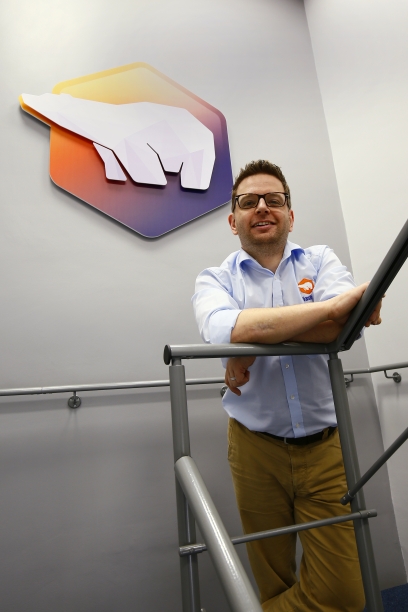4 minute read
10 Questions With – Nick Bound, MD of Transtherm
1 – What’s the best piece of advice you have ever been given?
Always stop short of saying yes when you should be saying no. Moreover, don’t be afraid of admitting when you don’t know the answer to something (you can always ask a colleague or go and find out) – Essentially, be honest! Over the years, we have seen many competitors sail too close to the wind and ultimately it has cost them. There will always be people who are smarter than you are and the worst thing you can possibly do is to try and pull the wool over their eyes. This has stood me in good stead personally and has always worked for the company.
2 – What’s one thing you have implemented in your business that you would encourage other manufacturers to embrace and implement?
A fit for purpose quality system using a UKAS accredited firm. For us and other SMEs who are working, hard to grow a business, it can seem a daunting, long-winded task. We have long held ISO 9001:2008 certification but as this is progressively phased out, we have employed a Quality Manager and are working with BSI to upgrade to the 2015 version. A solid, not over the top, fit-for-purpose quality system certainly reduces waste and errors, maximises resources and, importantly, helps to bring our team together. The staff using the procedures set out in our quality system are the experts and giving them, the chance to improve them has helped the company in ways that managers and directors couldn’t necessarily imagine.
3 – If you were given 1 million pounds – how would you invest that in your business?
As a company, we are growing year on year, so it is important to be mindful of investment. It can be easy for companies to take their eye off the ball during growth periods and, through lack of investment, ultimately hit a glass ceiling. We are currently in the throes of tripling our production space and would spend the money on investing in people to fill it. Having maximised output from our current facility, it will be this investment during the coming years that will set us on the next stage of sustained growth.
4 – What one thing would you change to make your business more efficient and productive if money was no object?
As a company, we have always looked to grow at a pace that is controllable, and invest wisely at the right time and this has always worked well for us. Therefore rather than additional machinery or other obvious assets it would be something involving staff satisfaction like someone to organise staff outings. Our workforce are hardworking and nothing brings us together like some karting or gorge walking etc. but it would nice to splash on some long weekends away. Our next company outing sees about 20 of us heading out for a meal and possibly some go karting, to help keep us fresh.
5 – What is a typical day for you? Time you wake up, get to the factory/office, go home etc.
I have never been a morning person but since having children I like to get up early to spend some time with them before leaving for work. I usually get up around 7:30am and arrive to work at 8:30am, I am extremely lucky in only having a 15-minute commute, so it is a short journey, where I can listen to the radio and catch up on the latest news. At the end of the working day, it is great to get home, catch up on what I’ve missed, once the kids are in bed, the laptop comes out to work on longer term projects, and when that’s done we’ll chat about what we might get up to at the weekend!
6 – How do you think the manufacturing community can collectively continue to engage and interest young people in manufacturing careers?
We regularly hire graduate engineers and operate an apprenticeship scheme. Their hunger, interest and fresh ideas have played a large part in the company’s success. Career progression, opportunities for additional training and working in a flexible company structure where skills can be put to good use have all meant that we have a great retention rate. Working to develop the most efficient products with the ability to communicate with other systems from anywhere in, the world and the challenge to be the best in fast- paced markets such as renewable energy and data centre’s is all the push that is needed.
7 – Any wise words, advice or tips for someone looking to pursue a career in manufacturing?
Go hi-tech and get involved. Britain is great at innovating and, it is our ability to learn and multitask that makes us so. If you want to excel and go far, be prepared to get stuck in and go the extra mile, all the while making the most of opportunities to learn from colleagues, customers, suppliers and mistakes. Luck works for some people but for the rest of us there is no substitute for confidence and graft. Why come to work and cruise when you can challenge yourself to be the best?
8 – How do you see smart technology (IoT & Industry 4.0) affecting the long-term growth of UK manufacturing?
All of the current buzz in our industry revolves around energy efficiency. I do not see this slowing down and without the IoT I don’t think we would be able to continue reducing energy consumptions and emissions at the rate we are. Hardware will continue to become more efficient in its own right – our Air Blast Coolers use the latest energy efficient fans and heat exchangers – but it is in the ability to make them integrate with one another and to fine tune them to work harmoniously together which is where the greatest gains can be made.
The IoT, in my opinion, is an amazingly interesting subject area and this helps to draw people’s attention, which is key in the change of culture that is required to aim higher. A simple but prime example would be smart thermostats for your home – ultimately they still control the temperature of your house but the fact that they give you consumption data and that they are a gadget encourages you to be more conscious of your energy usage!
9 – What is your view on post Brexit Britain – positive, negative or indifferent and why?
Overall, I would say that I have a positive view on a post Brexit Britain. This is because Britain will undoubtedly be, presented with a number of trade options that were not on the table whilst part of the EU. On balance, I believe that these opportunities will greatly outweigh any possible losses because of leaving. With exchange rates normalising after artificially bloated rates pre Brexit, it will make the export of our Nation’s goods far more attractive to various countries in and out of the EU.
10 – If you could choose, what would you like your legacy to be once you retire?
I would like Transtherm to have employed as many people and helped to support as many local families as possible. Since we serve renewable energy sectors, I would like to think that the products developed and sold during my time here have gone some way to securing a green future for my children’s generation and future generations to come.

Nick Bound, MD of Transtherm Cooling / Picture: Transtherm
10 Questions With… is a regular feature where we put a variety of quick fire questions to manufacturing leaders and role models to get to know the people behind manufacturing success in the UK.
If you wish to be featured on “10 Questions with…” please get in touch on hello@zenoot.com
